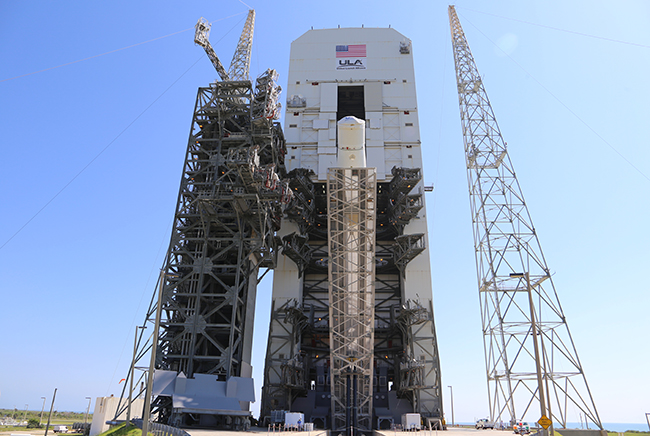
The Delta IV booster that will launch the GPS III SV 02 mission for the Air Force Space and Missile Systems Center rolls to the launch pad and goes vertical inside the Mobile Service Tower at Space Launch Complex-37 at Cape Canaveral AFS. Fla. United Launch Alliance photo.
Raytheon finished developing the newest version of the control system for the Air Force’s GPS III satellites one day before the second satellite is set to launch into space.
“We will begin deploying the Block 1 modernized monitor station receivers to their global locations this fall, keeping us on track to deliver the full system capability to the US Air Force by our June 2021 contractual deadline,” Bill Sullivan, vice president for Raytheon’s GPS Next-Generation Operational Control System (OCX), said in an Aug. 21 email.
The company told Air Force Magazine in April it planned to start rolling out Block 1 to users like Schriever AFB, Colo., by the end of June.
Block 1 is expected to command and control newer GPS III and IIIF satellites as well as earlier systems. OCX boasts greater cybersecurity, signal strength, accuracy, and anti-jamming capability, as well as the ability to connect to more satellites and shrink operations crew sizes.
In the meantime, the Air Force is on track to launch Lockheed Martin’s second GPS III satellite, dubbed Magellan, from Cape Canaveral AFS, Fla., on Aug. 22. The program’s initial July 25 launch was delayed by a voltage issue on the United Launch Alliance’s Delta IV Medium rocket. There are no open issues with the launch vehicle, an official said on an Aug. 20 call with reporters.
Thursday’s launch marks the 29th and final use of Delta IV before ULA retires the rocket.
The first GPS III satellite launched in December 2018. Lockheed is under contract for 10 GPS III systems and up to 22 GPS III Follow-On systems to improve upon the current constellation. The GPS III family boasts better accuracy and more secure capabilities than earlier versions.
Lt. Col. Maggie Sullivan, the Air Force’s GPS III program manager, told reporters the first satellite successfully finished its on-orbit checkout and test phase in July. It will transition to operations later in 2019.
Raytheon said earlier this year it was fixing bugs in OCX’s initial version, Block 0, between the first and second launches, with more on tap before the third satellite’s launch in December. The company did not provide specifics this week on which issues were resolved ahead of Magellan’s launch and what is left to do.
Raytheon has said it sees 2019 as a pivotal year for the new control system, which was first slated to enter operations in 2016 but faced multiple delays and ballooning costs.
“We are fully prepared for the launch tomorrow,” Bill Sullivan said.
The second GPS III launch offers the first opportunity for OCX to prove whether it can simultaneously support multiple satellites on orbit during launch and later system checks.
“The USAF recently conducted stress-testing that simulated multiple satellite control and demonstrated our system can handle communicating with multiple satellites,” Bill Sullivan said. “It went extremely well, and confirmed our readiness for tomorrow’s launch.”